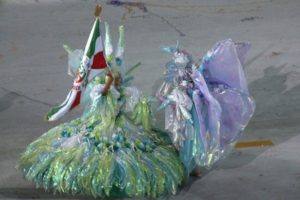Fantasies
by Lúcia BettencourtHer costume would be stunning, covered in sequins and feathers. She’d chosen the most spectacular one on the samba school website, not worrying about cost. Headdress, heels, rhinestones, feathers, and glitter galore – all eyes would be on her as she showed off the steps she’d learned at the dance studio in preparation for the big day.
 At the airport, she felt relaxed. She’d arrived on time, having checked in online, just a carry-on bag. No laptop to deal with; liquids in a Ziploc, backpack with shorts and tees, sandals, hairbrush, toothbrush. Couple of condoms tucked into her sneakers, just in case. Stashed in with her vitamins, the pills she’d gotten at the bar, from that trusty waiter who always got her good stuff. She had to keep tabs on what she spent, not go overboard.
At the airport, she felt relaxed. She’d arrived on time, having checked in online, just a carry-on bag. No laptop to deal with; liquids in a Ziploc, backpack with shorts and tees, sandals, hairbrush, toothbrush. Couple of condoms tucked into her sneakers, just in case. Stashed in with her vitamins, the pills she’d gotten at the bar, from that trusty waiter who always got her good stuff. She had to keep tabs on what she spent, not go overboard.
The gate was crowded, the plane delayed owing to bad weather. You could barely see anything outside. Snow falling, everything fifty shades of grey. She shivered. She would come up with other shades of grey, of black, of brown. Oh, those warm, colourful, exotic-flavored bodies, men of chocolate and cinnamon, spiced with pepper and…
Her flight was boarding. She snapped out of her reverie and got in line. Next stop: Rio de Janeiro, Samba and Carnival!
She put on her headphones to listen to the samba she’d downloaded from the school’s site. In that sultry, sun-bathed country of exotic smells, inhabited by people with sun-kissed, surf-soaked skin, she would be greeted with music and appreciative looks, make the splash she’d always dreamed of but never achieved. Near-sighted, she’d keep her eyes hidden behind thick sunglasses just like the other women. Some wore hats but all sported dark shades. Her blonde hair would shine in the sun and, having spent two weeks at the tanning salon, she would flaunt her body without shame. She’d sway her hips, let her breasts peek over her bold neckline. She’d chosen her T-shirts carefully; clinging to her wet body after dips in the beckoning sea, they would hint at her figure without giving too much away. Her curves weren’t quite as pronounced as she’d have liked, but she was shapely enough not to be embarrassed on the beaches.
She had her first shock on arrival: the hot, sticky weather hit her immediately, leaving her drenched in sweat, hair plastered down, limp and dull. Her body gave off unfamiliar odours.”
The parade would be best of all. Decked out in the most gorgeous costume, she’d be the centre of attention. She knew the lyrics even if she didn’t understand them, and had mastered all the dance steps. Her moves weren’t the most flamboyant but she would be cheered, admired, filmed, photographed. Surely she’d end the night in the arms of one of the male dancers, learning to play the tambourine with the funny name, pandeiro, which she always mixed up with the word for baker, padeiro. Those nasal vowels were so hard to keep straight, much less to pronounce! An entire year of language lessons and she hadn’t even reached the intermediate level. She’d been more concerned with the intensive dance classes focused on samba steps. She was ready: she’d be queen of the Carnival.
She had her first shock on arrival: the hot, sticky weather hit her immediately, leaving her drenched in sweat, hair plastered down, limp and dull. Her body gave off unfamiliar odours. Outside was even worse. There was no sun, the sky as grey as a winter day, and everywhere she saw only women, sweating and, oddly enough, all blonde. Even those with browner skin were blonde, or pseudo blonde, their dark roots contrasting with dye jobs that ranged from straw yellow to flaming red. Maybe that’s where the blazing heat was coming from. She felt faint and, in an act of desperation, resorted to using her water bottle to cool her overheated face, to sprinkle her arms and legs in a futile attempt to feel a bit cleaner.
 She arrived at the hotel looking like an exotic animal, hair glued to her skull, body streaked with sweat running down her skin. She holed herself up in her room. Although seaside, not all the hotel’s rooms had views. Hers looked out onto the side of another building, and only by leaning out the window could she catch a glimpse of the ocean, a grey sliver beyond a dirty-looking strip of sand. She closed the window, turned the air conditioning on high, and tried to cool off in the tiny shower, which trickled for a long time before she felt clean again and reasonably refreshed.
She arrived at the hotel looking like an exotic animal, hair glued to her skull, body streaked with sweat running down her skin. She holed herself up in her room. Although seaside, not all the hotel’s rooms had views. Hers looked out onto the side of another building, and only by leaning out the window could she catch a glimpse of the ocean, a grey sliver beyond a dirty-looking strip of sand. She closed the window, turned the air conditioning on high, and tried to cool off in the tiny shower, which trickled for a long time before she felt clean again and reasonably refreshed.
She called the front desk, trying to track down her costume. The website promised hotel delivery and she was eager to see her treasure. Nothing. She got the cheeky clerk to help her. His badge read Maicon and she couldn’t help but smile, realising this was a tropical rendering of the name Michael. Maicon informed her that there had been a slight delay, but the costume would get there in time. And with a sly wink, he assured her that’s just how things were in Brazil, everything got held up but worked out in the end.
So she went out, wanting to lay claim to the city, immerse herself in her dreams of Carnival. The stifling grey day diminished the beauty of the beach. But the mosaic sidewalk designs, the bodies so different from what she’d imagined, the sounds of a bustling city – shouting and laughter, traffic, startling horns – all boosted her spirits. After a short, hot, and sweaty walk, she sat at a seaside restaurant, accepted the suggestion to have a caipirinha, and ordered a heaping, flavourful, spicy dish that sparked her desire to try more caipirinhas, made with other fruits. Everything tasted delicious to her.
A group of musicians came to play beside her table; that was all it took for her to get up and rehearse some of the steps she’d learned in dance class. Head spinning, she felt as if her fantasy was becoming reality. She danced until her sandal strap broke, then paid the bill and strolled barefoot back toward the hotel. Along the way, she decided to soak her sore feet in the ocean. She dipped in her toes, then got her legs and thighs wet as she fought the waves that pulled her back each time she tried to get out. Holding her handbag above her head, she let the water wash over her, reach up to her navel, splash her chest and face. She felt happy even though this wasn’t exactly her dream come true. Where were the chocolate- and cinnamon-skinned men vying for her attention? The perfect bodies, athletic surfer builds?
Freeing herself from the waves, she made her way across the sand, passing a circle of men and women casually kicking a soccer ball back and forth; it would rise and almost fall to the ground before one of the participants decided to send it again. A trivial game, made up of deceptive moves and technique: the more casual the kick, the more perfect it seemed to be.
Back at the hotel, Maicon looked down his nose at her although still wearing a professional smile. He steered her toward the ‘bathers’ elevator and disappointed her, saying that her costume hadn’t been delivered yet but not to worry, the parade wasn’t until Sunday, there was still plenty of time.
She joined other hotel guests at the bar, had a few caipirinhas, and as the world seemed to spin faster, she felt like crying. Not even the crappy Carnival dream she’d splurged on matched her fantasies.”
She took another shower, lay down naked on the bed and fell asleep with the air conditioning blasting. She woke up not knowing quite where she was, what day or what time. The hum of the AC muffled the sound of torrential rain. She got dressed anyway, intending to go to Lapa, “the traditional hangout of Rio’s bohemian community”. Down in the lobby, she saw it was impossible to go out in that deluge. She joined other hotel guests at the bar, had a few caipirinhas, and as the world seemed to spin faster, she felt like crying. Crying because she was by herself in an impersonal hotel, just like any hotel in any city in the world. Crying because she was incurably lonely. Crying because her blonde hair didn’t stand out in a sea of dye jobs. Crying because she was 39 years, 2 months, and 7 days old and had never been in a steady relationship. Crying because not even the crappy Carnival dream she’d splurged on matched her fantasies.
She went up to her room and cried until she fell asleep.
The next day brought a little sun, enough to draw people to the beach. She, however, was entitled to “a sightseeing tour of the city’s most famous attractions” which would take her “from a favela to the world’s largest urban forest”; from Corcovado, “the hilltop where the statue of Christ the Redeemer, one of the seven wonders of the modern world, is situated” she would have “a 360o view of the Marvelous City’s expansive beauty.”
 Rather than an air-conditioned bus, though, her transport was an open jeep. She sat on a hard, uncushioned bench, bumping knees and thighs with other tourists dressed as though they were going on safari in Africa, and tried to steady herself through the curves and bends as they rounded Lagoa, made the steep climb up Rocinha, entered a forest cut by asphalt, and went way up high, where they were dropped in a clearing and had to scale the steps that took them to the wondrous Christ the Redeemer. It was from up there that she finally saw the Sambodromo, Carnival’s main stage. She looked down at Baia de Guanabara and was mesmerised by the islands and mountains that alternately interrupted the city and were strewn with colourful and crude constructions. It was all breathtaking. And hot. She snapped photos of everything: the monkeys scampering along the tree branches, the flocks of birds that flew across the paths, the crooked white smiles in black faces, the statue, the ocean. Selfies, panoramas. Video clips that she would share on social media proving to everyone that she was happy and knew how to live life to the fullest.
Rather than an air-conditioned bus, though, her transport was an open jeep. She sat on a hard, uncushioned bench, bumping knees and thighs with other tourists dressed as though they were going on safari in Africa, and tried to steady herself through the curves and bends as they rounded Lagoa, made the steep climb up Rocinha, entered a forest cut by asphalt, and went way up high, where they were dropped in a clearing and had to scale the steps that took them to the wondrous Christ the Redeemer. It was from up there that she finally saw the Sambodromo, Carnival’s main stage. She looked down at Baia de Guanabara and was mesmerised by the islands and mountains that alternately interrupted the city and were strewn with colourful and crude constructions. It was all breathtaking. And hot. She snapped photos of everything: the monkeys scampering along the tree branches, the flocks of birds that flew across the paths, the crooked white smiles in black faces, the statue, the ocean. Selfies, panoramas. Video clips that she would share on social media proving to everyone that she was happy and knew how to live life to the fullest.
On the way back to the hotel, they stopped at a restaurant to experience a “rodizio-style churrasco”. An endless orgy of meat and exotic appetisers, sheer ecstasy washed down with plenty of beer and caipirinhas. Among her companions, she discovered, were other tourists who would be parading with the same samba school. She was comforted by the news that their costumes hadn’t arrived at the hotel yet either, apparently a common occurrence in this country. The locals always did everything at the last minute; no need to worry. “It all works out in the end,” as she’d been taught in her language classes. The group made arrangements to meet in Lapa, where they’d go out en masse, one of the best things about Carnival.
She got ready, picking up accessories from street vendors. Hair ornaments, necklaces, bracelets. She touched up her lipstick and headed to Lapa, where a loud, sweaty, bewildering mob kept her from meeting up with her friends from the tour, but she didn’t much care. She danced, had a few beers, smiled a lot at less than good-looking men, who seemed interested in her but were actually going for the drinks she was buying. After a few steamy embraces and seductive lines, which she couldn’t understand, they’d go their separate ways, pulled by new guys who would turn up and then get lost in the sea of people. Hands belonging to men and women alike brushed up against her breasts and behind. Despite her willingness and decision to lower her expectations, she returned to her hotel alone. At the reception desk, she asked for Maicon, but he had the night off.
Her dream outfit was inside a black garbage bag. A huge disappointment. The whole thing was poorly made, hastily put together. The glued-on decorations were beginning to come off.”
The next day she woke up late, head pounding from too many cheap drinks. Maicon was on duty when she went downstairs; he advised her to have coconut water, a blessed cure for hangovers. It was muggy out. The sun would appear every so often, harsh and overpowering, scorching everything. She went to the beach, disheartened by her missing costume but reassured by Maicon, who had guaranteed her that the outfit would arrive in time. She dove underwater several times. Then she laid on her beach wrap, sipped more coconut water, and felt her skin sizzling, already punished by the merciless sun. She went back to the hotel and was greeted by the clerk’s professional smile: her costume was up in her room, waiting for her.
Her dream outfit was inside a black garbage bag. A huge disappointment. The whole thing was poorly made, hastily put together. The glued-on decorations were beginning to come off. And the costume was heavy. It had a huge headpiece, with feathers and iridescent strips of plastic. She put on the get-up. It was hot, hard to wear. Impossible to move in a crowd with it. She left her hotel room looking like some hybrid species: half sweaty tourist, half mermaid with rhinestones and fake jewels, shedding plastic scales along the way and hauling a black trash bag full of blue, green and white feathers perhaps intended to represent the ocean, although the water had been grey when she took her swim.
 She boarded the metro, where she recognised a number of other mythological creatures. She wandered disoriented until finding her school and discovering that her costume was one of a sea of others just like it. She tried to finish getting dressed on her own but that proved impossible. Assisted by other participants, with a little help here and there, she eventually ended up dressed, but hidden and lost in a world of people who took her into their fold nonetheless. The delay and the heat were tiring her out. She felt thirsty but wasn’t brave enough to drink the beer being offered, afraid she’d need to use the bathroom, which would mean getting undressed and then having to put all that paraphernalia back on again.
She boarded the metro, where she recognised a number of other mythological creatures. She wandered disoriented until finding her school and discovering that her costume was one of a sea of others just like it. She tried to finish getting dressed on her own but that proved impossible. Assisted by other participants, with a little help here and there, she eventually ended up dressed, but hidden and lost in a world of people who took her into their fold nonetheless. The delay and the heat were tiring her out. She felt thirsty but wasn’t brave enough to drink the beer being offered, afraid she’d need to use the bathroom, which would mean getting undressed and then having to put all that paraphernalia back on again.
All of sudden, fireworks went off; people joined hands and lined up. Nervous men and women gave contradicting commands, pushed and pressed into position, streaming forward at a rapid pace. Keeping up with the group required her to run a little and then, after rounding the bend, there she was on the main drag. People were shouting, waving flags. Everyone was belting out the samba with gusto. All eyes appeared to be turned toward her, the night’s brightest star, her costume sparkling, sumptuous beneath the floodlights. Her heart was racing, the costume no longer a burden as she danced and twirled, beaming in the company of the school.
Passing by the percussion section, her excitement grew and she spun, continuing to move forward, more and more intoxicated by the music and enthusiasm. During one spin, she felt her costume get caught on someone else’s and quickly tried to unsnare it. She was surprised to see Maicon, who looked at her with approval. Even after cutting loose from one another, they remained together the rest of the way. They were elated upon reaching the Praça da Apoteose and kissed in celebration. They took the bottle of water offered to them, drank a couple of sips, then poured the rest over their heads and kept dancing and singing.
Maicon hailed a cab with the expertise of a frequent carnival-goer. Exhausted, she leaned on him, impressed by the pecs that had been hidden beneath his hotel uniform. No one was surprised to see the two at the hotel and he gallantly saw her to her room. At the door, they kissed once more as friends, then again, with hunger and desire.
The next night, she headed back to the cold and her job. But she and Maicon exchanged contact info – phone numbers, FaceTime, WhatsApp and Instagram accounts, all the other possible means of communication.
Two months later, they were together again. She soon found out that the heart of the baby she was carrying in her womb beat to the rhythm of the samba, while Maicon grinned, thinking of the condoms forgotten inside her sneaker, his ticket to the First World.
Translated from the Portuguese by Kim M. Hastings
 Lúcia Bettencourt is the author of the award-winning short story collections A secretária de Borges (Borges’s Secretary, Editora Record, 2006) and Linha de sombra (Shadow Line, Editora Record, 2008) and the novels O amor acontece (Love Happens, Editora Record, 2012), and O regresso: A última viagem de Rimbaud (The Return: Rimbaud’s Last Journey, Rocco, 2015). Her book-length study of the banquet in literature was recognised by the Brazilian Academy of Letters. She has published four children’s books with two others forthcoming and is a regular contributor to the Brazilian literary press.
Lúcia Bettencourt is the author of the award-winning short story collections A secretária de Borges (Borges’s Secretary, Editora Record, 2006) and Linha de sombra (Shadow Line, Editora Record, 2008) and the novels O amor acontece (Love Happens, Editora Record, 2012), and O regresso: A última viagem de Rimbaud (The Return: Rimbaud’s Last Journey, Rocco, 2015). Her book-length study of the banquet in literature was recognised by the Brazilian Academy of Letters. She has published four children’s books with two others forthcoming and is a regular contributor to the Brazilian literary press.
 Kim M. Hastings is a freelance translator and editor based in the US. She lived in São Paulo for several years, studied Brazilian language and literature at Brown University, and holds a PhD in Spanish and Portuguese from Yale. Her translations include Edgard Telles Ribeiro’s award-winning novel His Own Man (O punho e a renda) and short fiction published in more than a dozen print and web magazines including Words Without Borders, Review: Literature and Arts of the Americas, Two Lines, Machado de Assis and stories by Marcelo Moutinho, Alberto Mussa, Nilton Resende and Ronaldo Wrobel for Bookanista.
Kim M. Hastings is a freelance translator and editor based in the US. She lived in São Paulo for several years, studied Brazilian language and literature at Brown University, and holds a PhD in Spanish and Portuguese from Yale. Her translations include Edgard Telles Ribeiro’s award-winning novel His Own Man (O punho e a renda) and short fiction published in more than a dozen print and web magazines including Words Without Borders, Review: Literature and Arts of the Americas, Two Lines, Machado de Assis and stories by Marcelo Moutinho, Alberto Mussa, Nilton Resende and Ronaldo Wrobel for Bookanista.
Read Kim’s interview with Lúcia
Read Kim’s translation of Lúcia’s ‘Circus Eroticus’
Carnival photographs: Andrei Snitko/Wikimedia Commons

